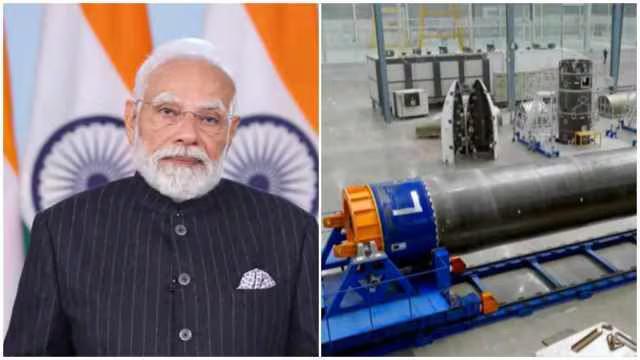
PM Modi unveils Vikram-1, India’s first privately developed orbital rocket
In a historic moment for India’s space sector, Prime Minister Narendra Modi on Thursday inaugurated the new Infinity Campus of space startup Skyroot Aerospace via video conferencing. The event marked a significant milestone in the country’s space journey, as PM Modi also unveiled Vikram-1, India’s first privately developed orbital rocket. The launch is a testament to the rapid progress being made in the Indian space industry, driven by innovation and entrepreneurship.
The Infinity Campus, set up by Skyroot Aerospace, is a state-of-the-art facility that will serve as the hub for the development and production of rockets. According to Skyroot Founder Pawan Chandana, the campus will have the capacity to produce one rocket every month, making it a game-changer for the Indian space sector. This increased production capacity will enable India to launch more satellites and explore space more frequently, further solidifying its position as a major player in the global space industry.
The unveiling of Vikram-1, India’s first privately developed orbital rocket, is a significant achievement for the country. The rocket is named after Dr. Vikram Sarabhai, a renowned Indian scientist and space pioneer. The development of Vikram-1 is a result of the collaborative efforts between Skyroot Aerospace and various other stakeholders, including the Indian Space Research Organisation (ISRO).
PM Modi, during the launch, emphasized the importance of this achievement, stating, “It’s a significant leap forward for India’s space sector.” He also highlighted the potential of the private sector in driving innovation and growth in the space industry. The Prime Minister’s remarks underscore the government’s commitment to supporting the development of the space sector and encouraging private participation in the industry.
The development of Vikram-1 is a major milestone for Skyroot Aerospace, which was founded in 2018 by Pawan Chandana and Bharath Daka. The startup has been working tirelessly to develop a range of rocket technologies, including the Vikram series of rockets. The Vikram-1 rocket is designed to be a highly efficient and cost-effective launch vehicle, capable of carrying small satellites into orbit.
The success of Vikram-1 has significant implications for the Indian space sector. It demonstrates the capabilities of Indian startups and the potential for private companies to play a major role in the development of the space industry. The launch of Vikram-1 is also expected to attract more investment and talent to the sector, driving further innovation and growth.
The Indian space sector has been witnessing rapid growth in recent years, driven by the government’s supportive policies and the emergence of innovative startups like Skyroot Aerospace. The sector has seen significant investments, with several startups raising funds from venture capital firms and other investors. The growth of the space sector is also expected to create new job opportunities and drive economic growth.
In conclusion, the unveiling of Vikram-1, India’s first privately developed orbital rocket, is a historic moment for the Indian space sector. It marks a significant leap forward for the country’s space industry, driven by innovation and entrepreneurship. The launch is a testament to the capabilities of Indian startups and the potential for private companies to play a major role in the development of the space sector. As India continues to push the boundaries of space exploration, the success of Vikram-1 is expected to inspire further innovation and growth in the sector.
The development of the Infinity Campus and the launch of Vikram-1 are major achievements for Skyroot Aerospace, and they demonstrate the company’s commitment to driving innovation and growth in the space sector. As the Indian space industry continues to evolve, it will be exciting to see the impact of these developments on the country’s space program and the global space industry as a whole.
The government’s support for the space sector, including the establishment of the Indian National Space Promotion and Authorisation Centre (IN–SPACe), has been instrumental in driving growth and innovation in the industry. The IN–SPACe is responsible for promoting and regulating the space sector, and it has been working closely with startups and other stakeholders to develop the industry.
As India continues to make rapid progress in the space sector, it is expected to become a major player in the global space industry. The country’s space program has already achieved several significant milestones, including the successful launch of the Chandrayaan-1 mission, which orbited the Moon and discovered water on the lunar surface.
In the coming years, India is expected to launch several new space missions, including the Gaganyaan mission, which aims to send an Indian astronaut to space. The mission is a major milestone for the Indian space program, and it will demonstrate the country’s capabilities in space exploration.
In the end, the launch of Vikram-1 is a significant achievement for India’s space sector, and it marks a major milestone in the country’s space journey. The success of the rocket is a testament to the capabilities of Indian startups and the potential for private companies to play a major role in the development of the space industry.




